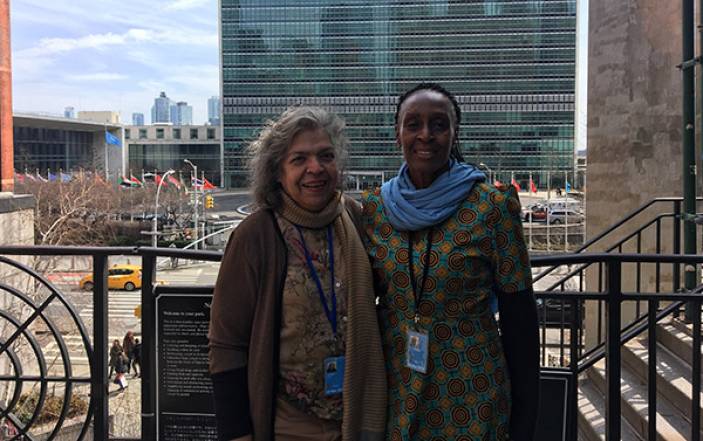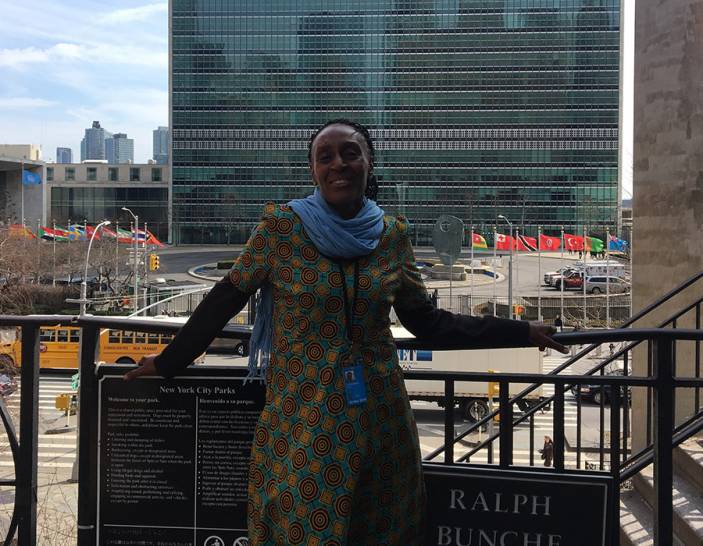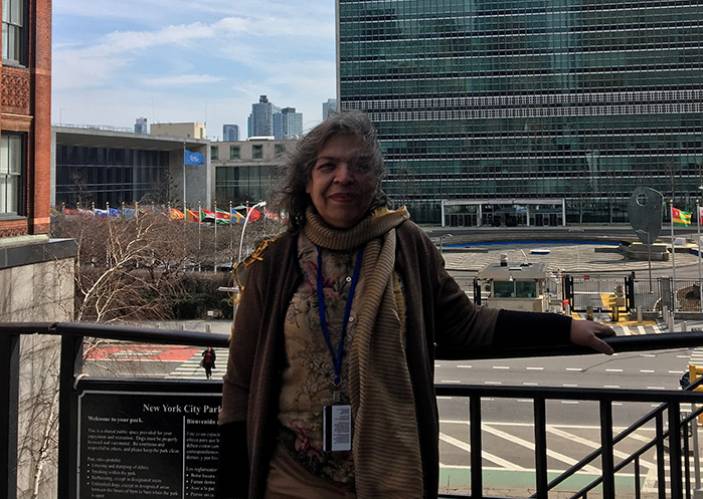
By Bilquis Tahira and Peace Kyamureku
After a lifetime of economic disadvantage and discrimination, women around the world often end up with little or no income to sustain an adequate standard of living in older age.
In early March, governments, multilateral agencies and civil society organisations met at the 63rd Commission on the Status of Women (CSW) to discuss women’s economic empowerment and the role of social protection systems for gender equality.
Two older women joined us in New York to call for universal social protection to guarantee the rights of older women everywhere. Here they share their experiences.
“We deserve to be treated like human beings” Peace, Executive Director of Ruth Fund Uganda.

In my country, they call older women off-layers, like the chickens sold off at the market for meat when they stop producing eggs.
The situation for older women is inexcusable and focussing only on issues earlier in life will not automatically address our challenges. We need to link what we say as feminists to the reality.
It feels like the system is rigged against us
All our lives we women work, work, work. You have a job but your family comes first and you never have time to yourself. Even when there are programmes that women can benefit from, they often don’t know about them. Who has time to listen to the announcements on the radio? Who has time to go to the meetings where they are discussed? Not the women.
When you earn money, there’s always someone waiting to spend it for you so you can’t save. Our patriarchal society means women cannot buy or hold on to land and other assets easily. There are not a lot of options for women and they lose out at every turn. It feels like the system is rigged against us. I worked my whole life and left my job due to family issues. I lost all my pension entitlements.
By the time we reach older age, the few protections we had often have fallen away. We walk a tight rope trying to earn enough money to survive while we can work. At the same time, our families still rely on us to work in the home and care for them. Who is paying older women for that work? Gender roles in the family continue until we are no longer here.
We are entitled to be treated like human beings
Historically the women’s movement in Uganda has focussed on education to empower women and we have seen a lot of progress. But show me what difference this makes to women in older age. We are all equally invisible. The systems are not in place to prevent us falling into poverty.
Older women need the confidence to know that income is coming. This is a question of justice.
In the meetings I attended here, no one mentioned older women at all. This really shows that there is a lot that needs to be done. Many times, even we as older women forget that we need to be talking about our issues. We feel we are ignored and cannot be listened to. Older women need to come out of hiding.
Part of the problem is admitting to ourselves and others we are ageing. The denial of ageing affects how we call for change. We should be the ones campaigning for our rights. We say we want to hear the voices of the youth, let’s hear the voices of the old too.
This is a human rights issue. We are entitled to be treated like human beings.
“Older women want an income of their own” Bilquis, Executive Director of Shirakat in Pakistan

I have had a very good life. I am here because of the sacrifices my parents made. However, I have to keep working. If I stop tomorrow, I would immediately slide down into poverty. There is nothing to protect me.
What struck me here at CSW is how many older women there were – a whole generation of activists with such a wealth of experience. They are involved in so many issues, but weren’t talking about older women’s rights. It’s so typical of women to be so self-effacing, the first thing we do is to think about everybody else before our own rights and needs. This must change if we want to make progress for older women. We need to pay attention to our own rights and wellbeing.
Older women need an income of their own
The women I spoke to before coming to CSW were quite clear – most older women want to be in paid work. It isn’t the work that they want though, they want an income of their own. They work because they have no other option.
In my culture, women can’t control their own assets. Someone is always planning and spending for you. As women get older they never want to ask for anything. Having no income and money of their own excludes them from decisions in their families.
My organisation does some income generation activities with older women. We joke with them that they won’t spend the money on medicines, they’ll give it to their grandchildren and buy things for their families. They laugh and agree, but it’s their money and doing these things helps them to feel respected and part of the family.
It’s time to put our foot in the door
I am optimistic. Campaigning for the rights of older women is not controversial or divisive like some other issues. It is easy to understand and accept that the way women work inside and outside the home through life puts them at risk later in life. While there hasn’t been enough focus on older women in New York, I have heard their issues mentioned in some sessions. It is a start.
In Pakistan, like so many places, the challenge is a lack of fiscal space. But we know that governments everywhere find resources for issues they think are a priority. It’s a question of will.
The time is ripe for us to make this a priority and put our foot in the door. We can all raise our voices and use the networks and contacts we have at every level to make sure governments are listening.
